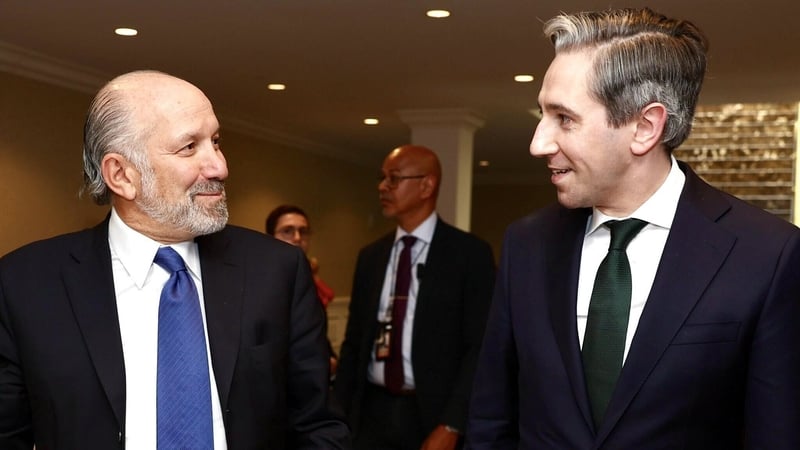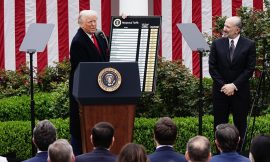Tánaiste Simon Harris has warned the US administration of the negative consequences of imposing tariffs on imported pharmaceuticals and microchips.
Mr Harris has written to US Secretary for Commerce Howard Lutnick following the latter’s instigation of two investigations examining whether the US’ reliance on foreign imports in those sectors poses a risk to national security.
Mr Lutnick has been a stern critic of the Irish corporate tax system and has previously described Ireland as his favourite “tax scam”.
The outcome of the investigations could result in significant tariffs being imposed on pharmaceutical and semiconductors sold into the US from abroad.
In his letter to Mr Lutnick earlier this month, Mr Harris said Ireland and the US enjoys a “mutually advantageous economic bilateral relationship”.
He acknowledged US foreign direct investment in Ireland is concentrated in a number of sectors, including pharma and semiconductors.
Mr Harris stressed Ireland’s approach on national security is “closely aligned” with Washington’s, as he signalled a “desire to work closely with the US on economic security issues”.
He then outlined details of the pharma and semiconductor sectors in Ireland.
On pharma, he highlighted the focus of production is primarily on ingredients, rather than final products.
“Ireland’s pharmaceutical sector is deeply embedded in that of the US. They are mutually reinforcing,” said Mr Harris.
On microchips, he said Ireland has built an “extensive and technology-rich semiconductor industry”.
The Fine Gael leader told Mr Lutnick that Ireland has a strong reputation as a leading destination for US foreign direct investment and is a “highly attractive destination” for US firms.
Mr Harris said Ireland’s “highly-skilled, flexible workforce”, and its “long-standing political and economic stability” attract US companies.
He said that investment in Ireland acts as a “base” to the wider EU market “which has a population of circa 450 million and represents one of the world’s most sophisticated and important global markets”.
Approximately 60% of Irish pharmaceutical exports go to non-US markets, said Mr Harris.
He added that the supply chains between Ireland and the US have been built up over decades and “supported by the existing zero-for-zero tariff arrangement”.
Mr Harris said that another key factor of the relationship between the two countries was “our close regulatory cooperation”, with a long-track record of pharmaceutical companies in Ireland securing recognition from the US Food and Drug Administration (FDA).
He said he was of the “strong view” that the Irish pharmaceutical sector “supports the health of the American people, and to impose tariffs on this sector risks not only the strides that need to be made in future innovation but also threatens the resilient supply chains needed to provide products to the US that have developed over recent decades”.
In conclusion, Mr Harris wrote: “I appreciate that you are undertaking these investigations due to national security concerns.
“Ireland’s trade with the US helps support resilient supply chains and diversifications, and providing certainty of supply.
“Increasing costs on two strategic sectors that face growing competition from other regions will not aid in supporting US interests.”
Read more: National semiconductor strategy targets 34,500 new jobs by 2040
‘Effectively stop trade’
Minister of State for European Affairs Thomas Byrne has warned that if President Donald Trump follows through on his threat to impose a 50% tariff on EU goods, it would “effectively stop trade” between the two blocs.
He said: “I think it would effectively stop trade, if that were the case, because I don’t think people would be willing to buy goods at a 50% tariff, and of course, there would be EU retaliatory measures.”
Speaking on RTÉ’s This Week programme, he said that the possibility of an US-EU trade war is “clearly very concerning” as it would be “very damaging for everybody”.
The junior minister said it was noteworthy that President Trump has not implemented the threat and trade talks are going on between the European Union and the US.
Mr Byrne added that the EU is a “very important trading partner to the US.”
Meanwhile, Minister of State John Cummins said a US-EU trade war is not inevitable, saying: “We have seen a shift in (US) policy positions throughout the last number of months. It’s far too early to say that.”
He told RTÉ’s The Week in Politics, in the aftermath of President Trump’s threat to impose a 50% tariff on EU imports to the US, that it’s “time for cool heads” to prevail and negotiations to continue as “tariffs are bad for consumers, and bad for business”.
The junior minister said the EU also needed to diversify its markets with more free trade agreements like CETA.
Social Democrats TD Rory Hearne said the task of concluding a trade agreement with the US was “extremely difficult” given what he termed the “completely erratic” behaviour of President Trump.
He expressed concern that “… the interests who are behind (President) Trump really don’t want the EU regulation of their corporations – like social media giants”, and claimed the US President “has it in for” the European Union.
Mr Hearne said the Government needs to diversify our economy away from its reliance on US multinational corporations, and there needs to be speedy action, such as heavily investing in domestic research and development.



